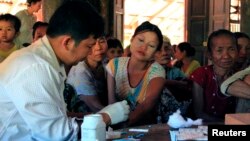Malaria-resistant "superbugs" are emerging in Southeast Asia, threatening worldwide control efforts, according to the authors of a new study.
Researchers reporting in the journal The Lancet Infectious Diseases found that a lineage of the P. falciparum parasite, which causes the most dangerous form of malaria, is now becoming resistant to the most effective malaria drug, and the resistance is spreading.
Artemisinin and combination therapies including artemisinin are considered the best possible treatment for malaria. The authors warned that resistance to the drug, and its widely used partner drug, piperaquine, was rapidly spreading throughout western Cambodia, southern Laos and northeastern Thailand.
The researchers, from Mahidol Oxford Tropical Medicine Research Unit in Thailand, said a global health emergency could occur if multi-drug-resistant parasites spread through India to sub-Saharan Africa.
Oxford University professor Nicholas White, a co-author of the study, said public health officials were losing "a dangerous race to eliminate artemisinin-resistant falciparum malaria before widespread resistance to partner antimalarials makes that impossible."
Global perspective urged
White added that unless resistance was tackled from a global public health emergency perspective, "the consequences of [drug] resistance spreading further ... could be grave."
In the Lancet article, researchers reported examining blood samples from patients with so-called uncomplicated malaria from a number of sites in Cambodia, Laos, Thailand and Myanmar. They found a single mutant parasite lineage replacing parasites containing less resistant mutations in three of the four countries.
"Superbugs," they noted, have evolved to contain multiple factors that make them "fitter and more transmissible."
Drug-resistant strains of malaria have spread before from Asia into Africa, killing millions, according to the authors. They called for public health officials to work with policy, research and funding partners to respond to the current threat in Asia "to avoid history repeating itself."
Mike Turner, the head of infection and immunology at Wellcome Trust in Britain, which funded the study, predicted that the number of deaths from drug-resistant malaria "will increase to millions of people every year by 2050" if nothing is done to address the current threat.
According to the World Health Organization, there were 212 million cases of malaria globally in 2015, resulting in 429,000 deaths. Most of the victims were children in sub-Saharan Africa.








